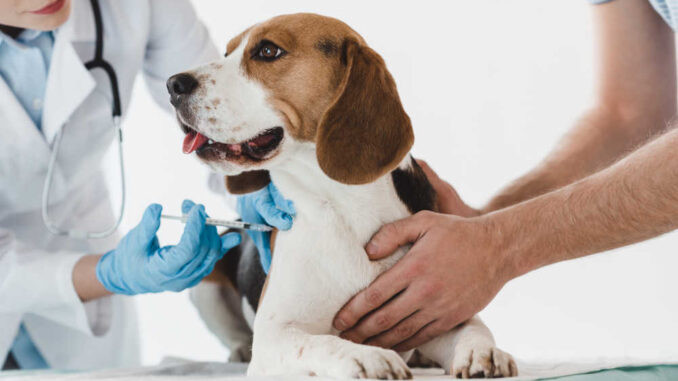
This article was updated on September 5th, 2023
Vaccines have a crucial role in keeping our furry family remembers safe. They help protect dogs from potentially life-threatening diseases and contribute to a longer, healthier life. However, as with any medical procedure, there may be occasional side effects. One possible side effect is the development of a lump at the site where the vaccine is given. Let’s explore what causes these lumps, whether you should be concerned (usually not!), and how to manage them.
What is a vaccine lump on a dog? How long do they last?
A vaccine lump is a small, localized swelling that can occur at the injection site after your dog receives a vaccine. Some lumps appear within the first few days after vaccination, while others may occur weeks later. These lumps are usually not concerning and a result of the body’s immune response to the vaccine. In most cases, this is temporary and harmless, and the lump will resolve on its own over the next few weeks.
What are the causes of vaccine lumps on a dog?
A vaccine lump is caused by the body’s immune response to the injected vaccine. When a vaccine is administered, it introduces a small amount of the disease-causing agent into the body – rendered harmless but still capable of stimulating the immune system. The organism may be killed or live but weakened. The body sends immune cells and fluids to the area to help process and react to the vaccine, which in some cases may cause localized swelling, creating a lump. It is also possible for a nearby lymph node to become enlarged in response to the vaccine.
When to be worried about vaccine lump on a dog
Sometimes a lump after vaccination can indicate a more serious problem or require additional testing and treatments. If you notice any of the signs below, it is time to contact your vet.
- The lump persists for more than three weeks.
- The lump is larger than two cm in diameter or is increasing in size.
- The lump is oozing a discharge or has a foul odor.
- The lump is causing your dog pain.
- You notice other signs of severe vaccine reactions such as vomiting, diarrhea, facial swelling, hives, collapse, or difficulty breathing.
What to do when you are worried about a vaccine lump on your dog
If you are worried about a lump at your dog’s vaccine site, especially if you notice any of the signs listed above, it is important to contact your vet. They will let you know if further diagnostics or treatments are recommended. In addition to a thorough physical exam, this may include:
- Cytology – Your vet may perform a fine needle aspirate to collect a sample of cells for observation under the microscope.
- Biopsy or removal of the lump – Your vet may remove a small part or the entire lump for evaluation by a specialist.
Depending on the issue, your vet may recommend continuing to monitor the lump, treating it with medications (such as antibiotics if infection is present), or having it surgically removed.
Can vaccine lumps be prevented?
Vaccine lumps form due to stimulation of the immune system, which is normal and expected after vaccination. It is important to follow the vaccine schedule and recommendations of your veterinarian. This may include:
- Vaccine-specific injection sites – It is recommended that each vaccine be given in a specific part of the body, for example, Rabies in the right rear leg.
- Discuss core vs. non-core vaccines – Core vaccines are recommended for all dogs, while non-core vaccines are dependent on lifestyle and risk of exposure.
- Pre-medicate dogs who have had previous vaccine reactions – Vaccine reactions can range from mild to severe. If your dog has had a vaccine reaction in the past, discuss with your vet if they would benefit from premedication prior to their next vaccine.
- Consider vaccine titers – If your dog has a history of a severe vaccine reaction, it may be possible to check titers to measure their immunity for specific diseases and help determine if additional vaccines are necessary.
- Space out vaccines – It may be possible to space out vaccines so that fewer shots are given at the same time.
A note to cat owners
Cats can also develop lumps after vaccines; however, this is often an indicator of a much more serious problem known as feline injection-site sarcoma.
Frequently Asked Questions
Should I consult a vet immediately if I notice a vaccine lump on my dog?
It is never wrong to contact your vet if you are concerned; however, a small lump at a vaccine site is most likely a normal side effect of vaccination. While vaccine lumps may be alarming at first, they are generally not a cause for concern. Remember, vaccines are essential for your dog’s well-being, and the benefits far outweigh the risks of minor side effects.
What is the major sign that can indicate a vaccine lump on a dog?
Vaccine lumps are typically small, firm, and may be slightly raised. They can develop within hours, days, or weeks after vaccination at the injection site. Of course, dogs can get many different types of benign or cancerous lumps on their body as well. To differentiate a vaccine lump from other lumps, keep in mind that vaccine lumps will generally develop soon after vaccination at the site where a vaccine was given, be small and localized, and not cause significant pain or discomfort. If you have any concerns about a lump on your dog, you should contact your vet.
Does a vaccine lump make a dog uncomfortable?
While your dog may be sore for a couple of days after receiving a vaccination, a lump at a vaccine site should not cause pain or discomfort. If it does, you should alert your vet.
What other side effects can occur after vaccination?
You can expect your pet to be back to normal soon after vaccination. However, for the first couple days, it is normal to notice minor side effects, including pain at the injection site, mild fever, lethargy, reluctance to play or exercise, decreased appetite, and sneezing (after a nasal vaccine). If your dog is having a more serious reaction, contact your vet or emergency clinic immediately.
Disclaimer: This website's content is not a substitute for veterinary care. Always consult with your veterinarian for healthcare decisions. Read More.


Be the first to comment